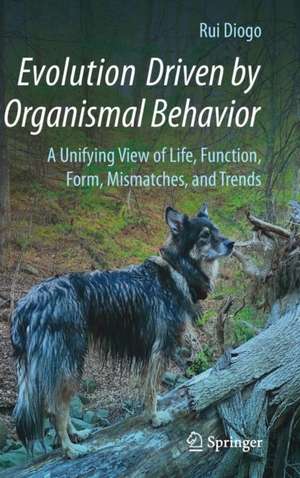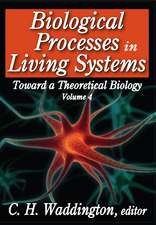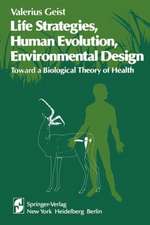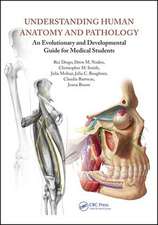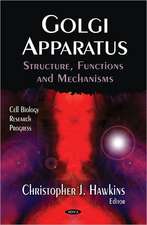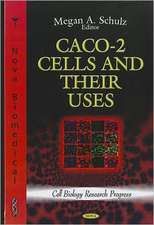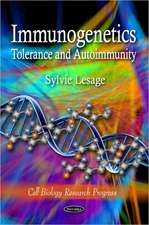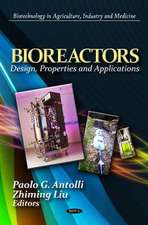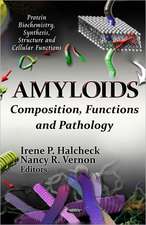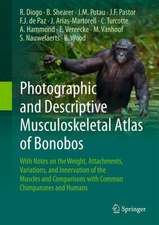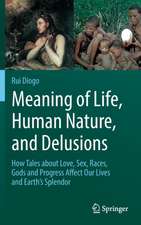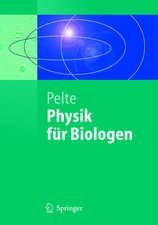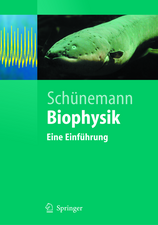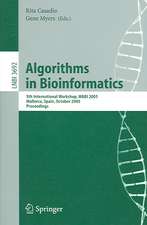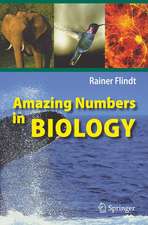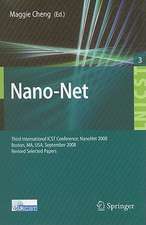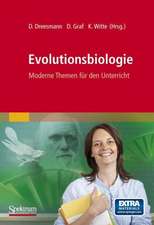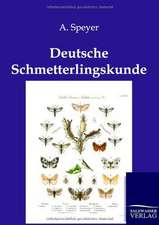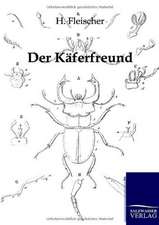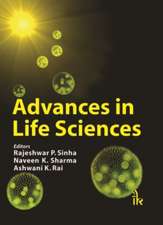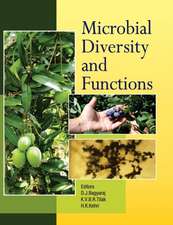Evolution Driven by Organismal Behavior: A Unifying View of Life, Function, Form, Mismatches and Trends
Autor Rui Diogoen Limba Engleză Hardback – 15 mar 2017
| Toate formatele și edițiile | Preț | Express |
|---|---|---|
| Paperback (1) | 251.60 lei 3-5 săpt. | |
| Springer International Publishing – 20 iul 2018 | 251.60 lei 3-5 săpt. | |
| Hardback (1) | 259.95 lei 3-5 săpt. | |
| Springer International Publishing – 15 mar 2017 | 259.95 lei 3-5 săpt. |
Preț: 259.95 lei
Nou
Puncte Express: 390
Preț estimativ în valută:
49.75€ • 51.75$ • 41.69£
49.75€ • 51.75$ • 41.69£
Carte disponibilă
Livrare economică 21 februarie-07 martie
Preluare comenzi: 021 569.72.76
Specificații
ISBN-13: 9783319475806
ISBN-10: 3319475800
Pagini: 167
Ilustrații: XVIII, 252 p. 26 illus., 14 illus. in color.
Dimensiuni: 155 x 235 x 21 mm
Greutate: 0.56 kg
Ediția:1st ed. 2017
Editura: Springer International Publishing
Colecția Springer
Locul publicării:Cham, Switzerland
ISBN-10: 3319475800
Pagini: 167
Ilustrații: XVIII, 252 p. 26 illus., 14 illus. in color.
Dimensiuni: 155 x 235 x 21 mm
Greutate: 0.56 kg
Ediția:1st ed. 2017
Editura: Springer International Publishing
Colecția Springer
Locul publicării:Cham, Switzerland
Cuprins
Preface.- Dedication.- Acknowledgements.- Introduction to Organic Nonoptimal Constrained Evolution (ONCE) and Notes on Terminology.- Baldwin's Organic Selection and the Rising Awareness of the Evolutionary Importance of Behavioral Shifts.- Behavioral Choices and Shifts, Niche Construction, Natural Selection, Extinctions, and Asymmetry.- Evolutionary Trends, Sexual Selection, Novelties, Gene Loss, Mass Extinctions and 'Progress'.- Behavioral Leads in Evolution--Form, Function, Exaptations, Human Evolution and Lamarck.- Eco-morphological Mismatches, Human 'Exceptionalism', Hybridization, Trade-offs and Nonoptimality.- Internal Selection, Constraints, Contingency, Homology, Reversions, Atavisms, von Baer, Haeckel, and Alberch.- ONCE Links Internal Factors, Epigenetics, Matsuda, Waddington, Goldschmidt, and Macroevolution.- ONCE Things Are Put Together: Evolutionary Behavioral Ecology, Adaptationism, Systems Biology, and Interdisciplinary.- General Remarks and Bullet Points.- References.- Index.
Recenzii
“Rui Diogo has published a book that goes against the current in being truly large in scope but also single-authored. … The book is full of vignettes of ideas and of papers and the alternative explanations the author provides to some of the conclusions of those papers.” (Marcelo R. Sa´nchez-Villagra, Swiss Journal of Palaeontology, Vol. 137, 2018)
“In this relatively slim, but very ambitious volume, the author lays out his own view of how morphological evolution takes place in the context of the many variables that may influence its path. … the 415-entry bibliography is very impressive, and reads like a who’s who of evolutionary biology. This is an impressive work that is jam-packed with complex concepts and ideas. … everyone should find it rewarding and thought-provoking.” (John G. Fleagle, The Quarterly Review of Biology, Vol. 92 (4), December, 2017)
“The book is a provocative and worthy addition to the field. … this interesting book is suitablefor all four-year colleges and above. Summing Up: Recommended. Upper-division undergraduates and above; faculty and professionals.” (J. Nabe, Choice, Vol. 55 (1), September, 2017) “In this relatively slim, but very ambitious volume, the author lays out his own view of how morphological evolution takes place in the context of the many variables that may influence its path. … the 415-entry bibliography is very impressive, and reads like a who’s who of evolutionary biology. This is an impressive work that is jam-packed with complex concepts and ideas. … everyone should find it rewarding and thought-provoking.” (John G. Fleagle, The Quarterly Review of Biology, Vol. 92 (4), December, 2017)
“The author presents an integrated picture of the origins of evolutionary theory, how it has progressed over time, and provides context for how he has developed ONCE, an integrative and unifying viewpoint about evolution that focuses on behavior of the individual organism, as opposed to a gene-based model, as a driving mechanism to evolution. This book would be useful for graduate students in the biological sciences and history and philosophy of science.” (Anne M. Burrows, Frontiers in Ecology and Evolution, July, 2017)
“Rui Diogo’s new book is not only a brilliant collection of theoretical and empirical data on biological evolution but also an attempt to provide an empirically based explanation for the two most ‘difficult’ phenomena in the theory of evolution. … The book will be interesting and helpful for students, as well as experts in other fields, as it contains a nearly encyclopedic overview of empirical data and theoretical ideas in the scope of biological evolution including the most recent ones.” (Varvara Dyakonova, Evolutionary Psychological Science, July, 2017)
“Rui Diogo’s new book is not only a brilliant collection of theoretical and empirical data on biological evolution but also an attempt to provide an empirically based explanation for the two most ‘difficult’ phenomena in the theory of evolution. … The book will be interesting and helpful for students, as well as experts in other fields, as it contains a nearly encyclopedic overview of empirical data and theoretical ideas in the scope of biological evolution including the most recent ones.” (Varvara Dyakonova, Evolutionary Psychological Science, July, 2017)
Notă biografică
Rui Diogo is an Associate Professor at Howard University College of Medicine and a member of the Resource Faculty at the Center for the Advanced Study of Hominid Paleobiology at George Washington University. One of the youngest researchers to be nominated as Fellow of the American Association of Anatomists, he won several prestigious awards, being the only researcher to be selected for the first/second place for best article of the year in the top anatomical journal two times in just three years (2013/2015). Author or co-author of more than 100 papers in top journals, such as Nature, and of numerous book chapters, he is the co-editor of three books and the sole or first author of eleven books covering subjects as diverse as fish evolution, chordate development, and human medicine and pathology, including a book adopted at medical schools worldwide, "Learning and understanding human anatomy and pathology: an evolutionary and developmental guide for medical students."
Textul de pe ultima copertă
This book proposes a new way to think about evolution. The author carefully brings together evidence from diverse fields of science. In the process, he bridges the gaps between many different--and usually seen as conflicting--ideas to present one integrative theory named ONCE, which stands for Organic Nonoptimal Constrained Evolution. The author argues that evolution is mainly driven by the behavioral choices and persistence of organisms themselves, in a process in which Darwinian natural selection is mainly a secondary--but still crucial--evolutionary player. Within ONCE, evolution is therefore generally made of mistakes and mismatches and trial-and-error situations, and is not a process where organisms engage in an incessant, suffocating struggle in which they can't thrive if they are not optimally adapted to their habitats and the external environment. Therefore, this unifying view incorporates a more comprehensive view of the diversity and complexity of life by stressing thatorganisms are not merely passive evolutionary players under the rule of external factors. This insightful and well-reasoned argument is based on numerous fascinating case studies from a wide range of organisms, including bacteria, plants, insects and diverse examples from the evolution of our own species. The book has an appeal to researchers, students, teachers, and those with an interest in the history and philosophy of science, as well as to the broader public, as it brings life back into biology by emphasizing that organisms, including humans, are the key active players in evolution and thus in the future of life on this wonderful planet.
Caracteristici
Proposes a new way to think about evolution Demonstrates that organisms and their behavioral choices are key, active players in evolution Synthesizes evidence from many fields of science and from all kinds of organisms, from bacteria to mammals, with a strong emphasis on human evolution Includes supplementary material: sn.pub/extras
